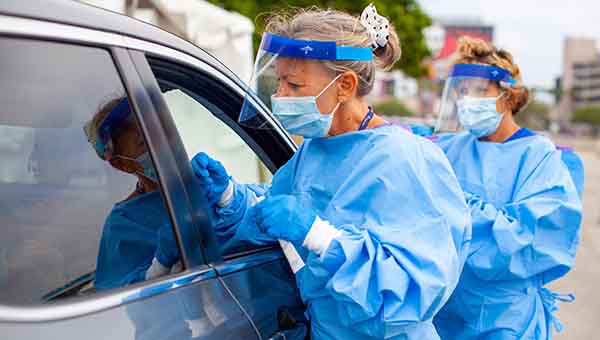COVID-19 Delta Variant FAQ

On July 27, 2021 the Centers for Disease Control and Prevention once again recommended all individuals, even those who have been vaccinated, wear masks indoors in certain circumstances as COVID-19 infections increase across the country. The main culprit is believed to be the Delta variant, a highly-contagious form of the virus that is now believed to account for most of the cases in the country. Learn more about the variant and how to protect yourself and your loved ones:
What is the Delta variant?
Throughout the pandemic, the novel coronavirus has spawned new variants as the virus, transported across continents and impacting populations, mutates to survive. The Delta variant, which is proving to be more contagious, was first identified in India in December 2020 and is now the dominant strain in the US with 83 percent of the new cases positive for the Delta variant (as of July 22, 2021).
How is the Delta variant different from earlier COVID variants?
The Delta variant is believed to be about 50 percent more contagious than previous strains because it multiplies more rapidly in people’s respiratory tracts, creating higher viral loads in infected individuals and making them infectious sooner. Earlier in the pandemic, infected individuals were believed to be infectious around Day 6 after exposure; with the Delta variant, it is around Day 4. Because of this, it also spreads much easier. For every 1 person infected with the Delta variant, without proper infectious disease precautions, they will most likely spread it to up to 7 people. For comparison with the prior strains, 1 infected person spread it to about 2-3 other people.
Is the Delta variant more deadly?
The Delta variant is proving to be more transmissible – so it’s more likely an exposed, non-vaccinated person will be infected than with previous strains. But, so far, it appears the Delta variant is no more likely to lead an infected person to be hospitalized.
Are children or young adults more susceptible to the Delta variant?
There is no evidence yet that the Delta variant has any preference by age. However, it is known that the Delta variant is more infectious and children and young adults are both among the groups with the lowest vaccination rates. Children under 12 years old are not eligible for a vaccine as only the Pfizer vaccine has been approved for use in children 12 and older in the United States. Also, young adults are among the country’s least vaccinated population groups.
How can I protect myself from the Delta variant?
If you are eligible, get a COVID-19 vaccine. Even if you happen to still get COVID-19 after being vaccinated, your complications from the virus are greatly diminished. And regardless of vaccine status, the simple but important public health practices learned earlier in the pandemic still apply: Practice good hand hygiene and, when indoors and in crowded settings, wear a mask and practice social distancing.
I’ve already had COVID-19, do I need to worry about the Delta variant?
Yes, you can get COVID-19 a second time. While your body produces antibodies for a while after you successfully recover from COVID, scientists aren’t yet sure how long that protection lasts or how effective they may be against more infectious strains such as the Delta variant. If you have not yet received a vaccine and you are eligible for a vaccine, talk to your doctor about when it makes sense for you to take that additional step of protection.
Why aren’t the vaccines better at fighting off the Delta variant?
The COVID-19 vaccines are believed to be providing good protection against every strain of COVID thus far. And the vaccines are protecting most of those vaccinated individuals who have a “breakthrough” case of COVID from having worse medical complications which could require hospitalization. But no vaccine is 100% effective and until there is herd immunity – meaning enough people have developed immunity to COVID so that the virus has difficulty finding new hosts to infect – we can anticipate the virus will continue to evolve. Scientists believe the United States could obtain herd immunity when about 70 percent of the population is vaccinated.
For more information about COVID-19, visit BayCare.org/coronavirus.


